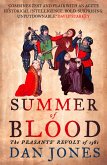The German Peasants' War was the greatest popular uprising in Western Europe before the French
Revolution. Like a vast contagion it spread from southwest Germany through Württemberg, Swabia, the
Allgäu, Franconia, Thuringia, Saxony to Alsace in what is now France, Austria, and Switzerland. It moved along
the valleys from one region to another, and it broke out unexpectedly in areas far away. Everywhere, the
peasants were 'up', massing in armed bands. Authority and rulership collapsed, the familiar structures of the
Holy Roman Empire were overturned, and the fragility of the existing social and religious hierarchies was
exposed. People even began to dream of a new order.
It did not last. In spring 1525, the 'Aufruhr' or the 'turbulence' as contemporaries called it, had reached its
height, rolling all before it. But by May the tide had turned. Somewhere between seventy and a hundred
thousand peasants were slain by the forces of the lords as they put down the revolt. That summer of blood,
maybe one per cent of the population of the region of the war were killed, an enormous loss of life in just
over two months.
Summer of Fire and Blood follows a cataclysmic event that involved vast numbers of people moving in
turbulent flows as they sought to change their world. The vision that drove them was about peoples'
relationship to creation, and that is why it still matters now. Going back to the moment before the structures
of our own world were set up can help us to see new answers to the questions that confront us today. The
peasants' story matters too because discloses a radical Reformation, with a theological, social and political
vision that could have gone in a different direction. This is the Reformation we have lost sight of, and this is
why we need to understand what drove the peasants. For what mattered to them also matters to us.
Revolution. Like a vast contagion it spread from southwest Germany through Württemberg, Swabia, the
Allgäu, Franconia, Thuringia, Saxony to Alsace in what is now France, Austria, and Switzerland. It moved along
the valleys from one region to another, and it broke out unexpectedly in areas far away. Everywhere, the
peasants were 'up', massing in armed bands. Authority and rulership collapsed, the familiar structures of the
Holy Roman Empire were overturned, and the fragility of the existing social and religious hierarchies was
exposed. People even began to dream of a new order.
It did not last. In spring 1525, the 'Aufruhr' or the 'turbulence' as contemporaries called it, had reached its
height, rolling all before it. But by May the tide had turned. Somewhere between seventy and a hundred
thousand peasants were slain by the forces of the lords as they put down the revolt. That summer of blood,
maybe one per cent of the population of the region of the war were killed, an enormous loss of life in just
over two months.
Summer of Fire and Blood follows a cataclysmic event that involved vast numbers of people moving in
turbulent flows as they sought to change their world. The vision that drove them was about peoples'
relationship to creation, and that is why it still matters now. Going back to the moment before the structures
of our own world were set up can help us to see new answers to the questions that confront us today. The
peasants' story matters too because discloses a radical Reformation, with a theological, social and political
vision that could have gone in a different direction. This is the Reformation we have lost sight of, and this is
why we need to understand what drove the peasants. For what mattered to them also matters to us.
Dieser Download kann aus rechtlichen Gründen nur mit Rechnungsadresse in A, B, BG, CY, CZ, D, DK, EW, E, FIN, F, GR, HR, H, IRL, I, LT, L, LR, M, NL, PL, P, R, S, SLO, SK ausgeliefert werden.









